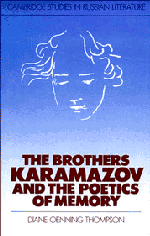
-
Select format
-
- Publisher:
- Cambridge University Press
- Publication date:
- November 2011
- June 1991
- ISBN:
- 9780511897719
- 9780521111478
- Dimensions:
- Weight & Pages:
- Dimensions:
- (216 x 140 mm)
- Weight & Pages:
- 0.48kg, 380 Pages
You may already have access via personal or institutional login- Subjects:
- Literature, Area Studies, Literary Theory, European Literature, European Studies
Book description
The Brothers Karamazov is Dostoevsky's last and most complex novel. It represents the fullest expression of his quest to achieve a literary work which would express the dilemmas and aspirations of his time and also represent the eternal, absolute values he perceived in the Christian tradition. Diane Thompson's study focuses on the meaning and poetic function of memory in the novel, and seeks to show how Dostoevsky used cultural memory to create a synthesis between his Christian ideal and art. Memory is considered not only as a theme or subject, but also as a principle of artistic composition. This interpretation identifies those aspects of cultural memory Dostoevsky incorporated into his novel, and analyses how he used them as significant components of his characters' memories. This challenging study sets Dostoevsky's work in a new perspective. It will appeal to scholars of Russian and comparative literature.
Contents
Metrics
Full text views
Full text views help Loading metrics...
Loading metrics...
* Views captured on Cambridge Core between #date#. This data will be updated every 24 hours.
Usage data cannot currently be displayed.
Accessibility standard: Unknown
Why this information is here
This section outlines the accessibility features of this content - including support for screen readers, full keyboard navigation and high-contrast display options. This may not be relevant for you.
Accessibility Information
Accessibility compliance for the PDF of this book is currently unknown and may be updated in the future.


